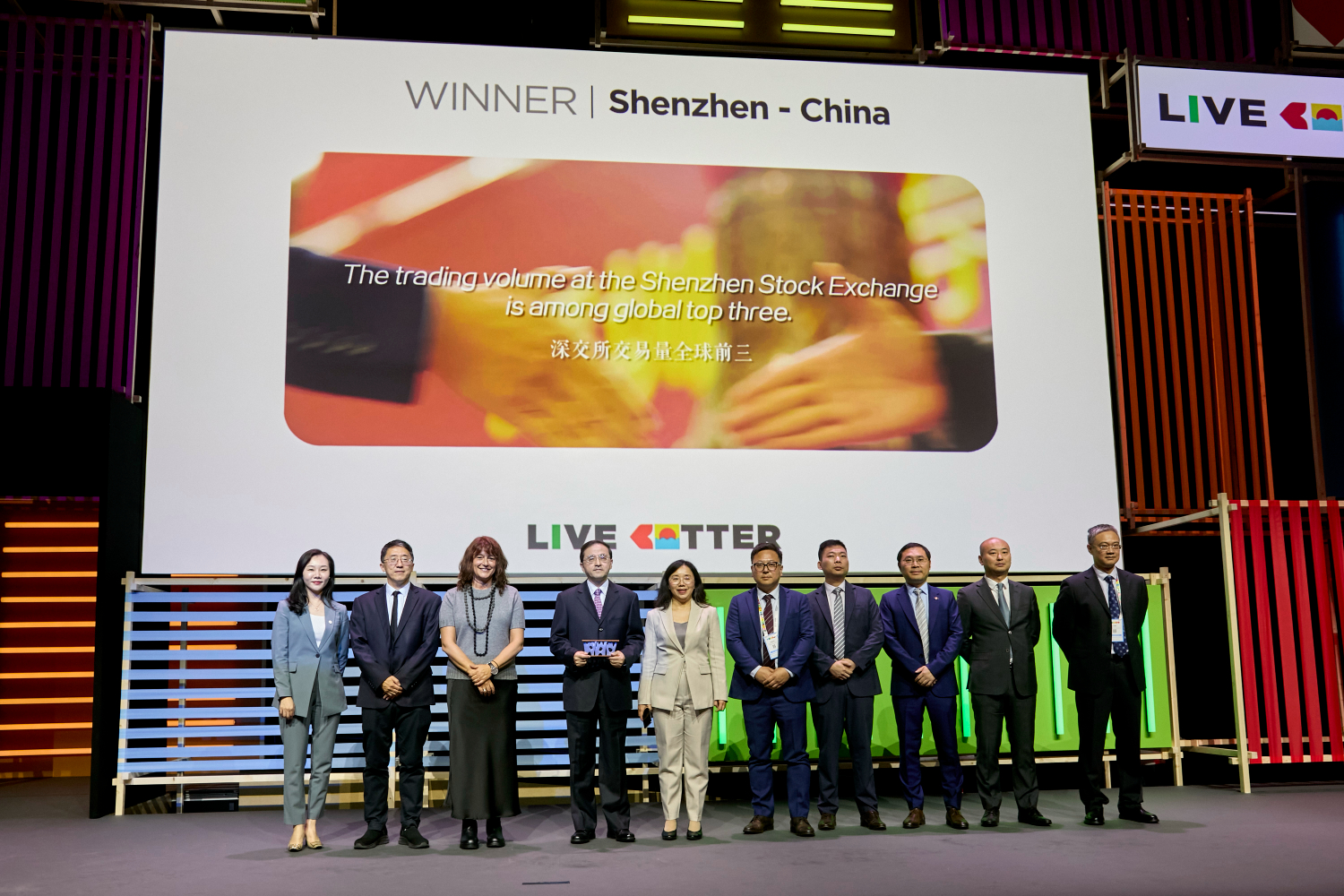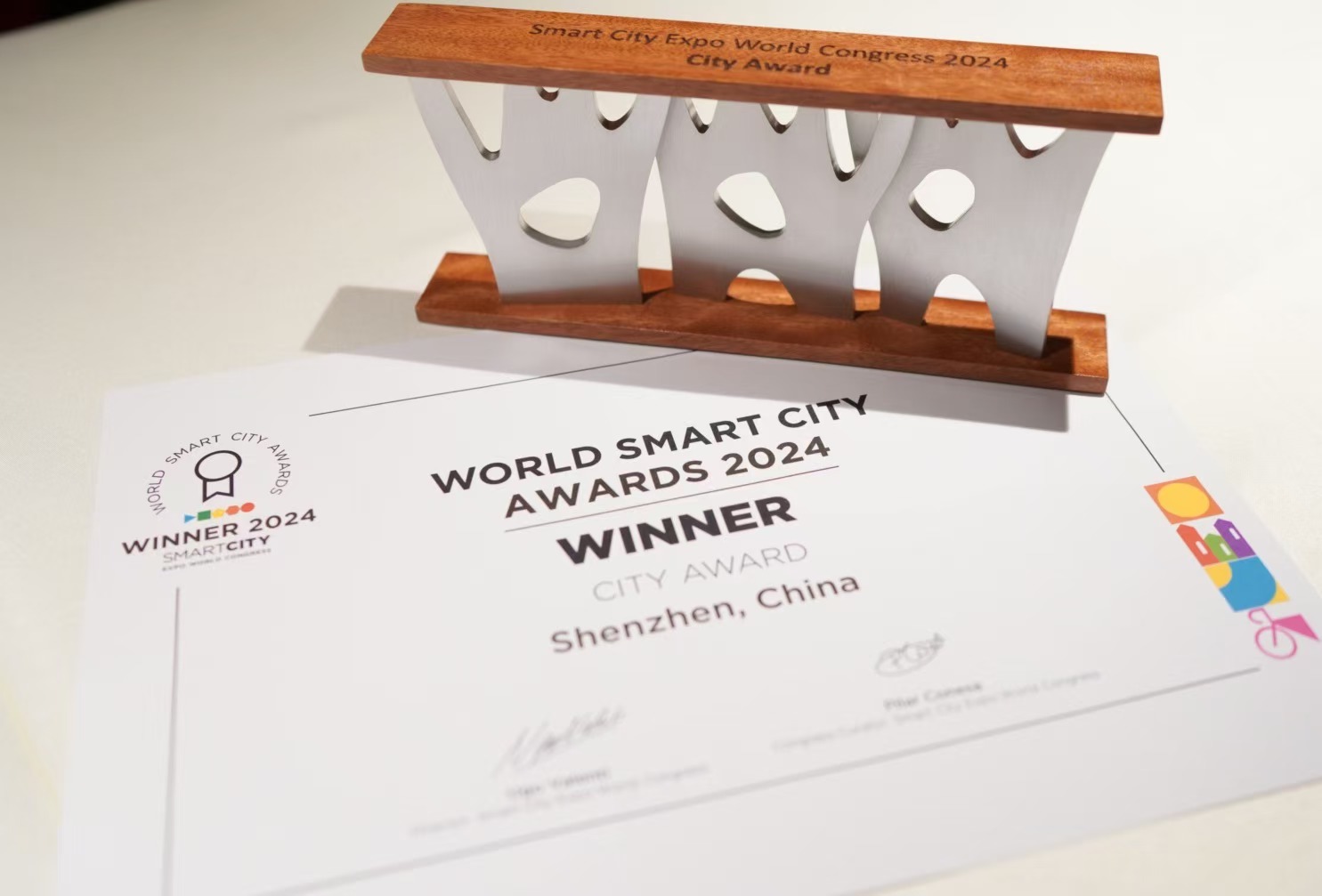Shenzhen awarded World Smart City, demonstrating global influence of social governance as mega city

The city of Shenzhen in south China's Guangdong Province wins the City Award at the 2024 Smart City Expo World Congress (SCEWC) in Barcelona, Spain.
The city of Shenzhen in south China's Guangdong Province was announced winner of the City Award at the 2024 Smart City Expo World Congress (SCEWC) in Barcelona, Spain.
Standing out among 429 candidate cities from 64 countries and regions, Shenzhen's winning demonstrated China's extraordinary strength and potential in building smart cities.
SCEWC is a large thematic expo focusing on urban and social smart development and transformation, with a total of 14 sessions having been organized since 2011. The event has received long-term support from the United Nations Human Settlements Program (UN-Habitat), World Economic Forum, World Bank, C40 Cities, the European Union (EU) and other international and regional organizations in parallel forums and activities, ecology publicity, branding partnerships, exhibition organizing and so on.
SCEWC has established the annual World Smart City Awards, which include multiple categories of awards such as the City Award, the Innovation Award, the Leadership Award and the Project Awards. Among them, the City Award is a top honor granted by SCEWC, with only one winner city each year. The highly-professional award is evaluated by an expert panel consisting of professionals from the aforementioned international and regional organizations.
Themed "Live Better", the 2024 SCEWC was held in Barcelona on November 5 to 7, attracting 850 city delegations from 146 countries. This year's event mainly consisted an opening ceremony, over 240 forums and side activities, a smart city exhibition area of 80,000 square meters, 141 closed sessions featuring cities, over 300 closed sessions featuring enterprises, as well as an awarding ceremony of the World Smart City Awards.
During the event, Shenzhen also organized a smart city promotional meeting to showcase its achievements of smart city construction and support Shenzhen-based enterprises in overseas businesses. Enterprises including Shenzhen Smart City Group, Shenzhen Data Exchange, Huawei and Tencent shared their achievements.
Centered on the theme of "smarter city, better life", the "comprehensive solution for building a smart city" tendered by Shenzhen integrates the city's people-oriented concept of smart city construction and provides several highlight cases.

The city of Shenzhen in south China's Guangdong Province wins the City Award at the 2024 Smart City Expo World Congress (SCEWC) in Barcelona, Spain.
The SCEWC believes that Shenzhen has comprehensively demonstrated its innovation outcomes and excellent solutions in key areas such as enabling technology, transportation, energy and environment, governance, industry and economy, livability and inclusiveness, safety and emergency response, infrastructure and construction, and has created an intelligent and humanistic digital city with its unique urban development philosophy, foundation and landscape.
In recent years, Shenzhen has concentrated on benefiting its people, vitalizing industries and optimizing governance, prioritized the four "urban frontrunners" of digital twin, ultra-fast broadband, global digital energy and artificial intelligence (AI), developed digital twin city and self-evolving intelligence agents, accelerated the cultivation and development of digital twin and AI-driven new quality productive forces, and endeavored to achieve full situational awareness, all networks synergy, holistic business integration and all scenarios intelligence, so that the city is capable of perceiving, thinking, evolving and caring, to provide proactive, accurate, intelligent and efficient services to citizens and businesses.
In terms of government services, Shenzhen has developed the iShenzhen app to provide citizens with government services within a touch. It covers service resources targeting the full lifecycle of individuals and all urban scenarios including birth, elderly care, medical care, child rearing, education, housing, transportation and tourism, offering accessibility to over 8,600 service items and allowing more than 95 percent of individual-related government services in the city to be handled online. The app brings together 407 types of electronic licenses and certificates including identification card and driver's license, and provides a package of certificate services covering multiple frequent scenarios like formality handling, traveling and seeking medical treatment. Nine foreign language versions are available on the international channel of iShenzhen, providing foreign users with "one-stop" services including policies and regulations, city information, travel guides and other frequently-used foreign-related services. So far, the app has over 20 million registered users and has offered over 7 billion times of fingertip services.
In terms of social governance, to address the daily concerns of citizens, guarantee unimpeded channels for expressing demands, coordinate interests and safeguard the rights and interests of citizens, and well handle various kinds of formalities, Shenzhen started a comprehensive service reform in 2022 to integrate a total of 537 demand expressing channels into a comprehensive platform, so that the masses can report their demands in a more efficient and convenient way. In addition, the platform provides the entire handling process in a real-time manner, making it as visible and traceable as online shopping. Over the past several years, the platform has handled more than 37 million cases, with timely response to around 90 percent of the appeals, gaining an overall satisfaction rate of over 99 percent.
In terms of urban governance, Shenzhen has preliminarily built the digital twin base for the entire city area. Combining nearly 10,000 Building Information Modelling (BIM) refined models of major buildings, it forms a digital twin data system that covers 3 primary categories, which are urban basic space, management targets and IoT perception, and 25 subcategories, offering over 4,000 data services. The city has created more than 200 digital twin application scenarios including the industrial scenarios of urban water management, power charge, storage and discharge, as well as the planning and design of the 5th-phase rail transit. It has also promoted the comprehensive application of digital twins in urban areas like Houhai, Xiangmi Lake and Guangming Science City. For example, by creating applications for urban flood disaster prevention and relying upon the graph for urban water management, flood disaster risk model and contingency plans for different working conditions, Shenzhen utilizes 3D models to carry out simulation of flood disaster in key districts and analysis of affected areas, reinforce the accuracy of identifying water-logging risks and explore new paths of addressing the urban water-logging issue. Depending on high rendering capability to visually present complex surface and underground space planning, the Xiangmi Lake digital twin comprehensive application assists in digital decisions such as city silhouette review, urban landscape design, and comparative selection of projects, advancing the establishment of a whole lifecycle digital twin management model of key areas covering planning, design, construction and operation.
Next, Shenzhen plans to further deepen the building of a smart city to create a more heartwarming, inclusive and desirable city, committed to showcasing smart city development in China and even around the world. (Edited by Yu Huichen, yuhuichen@xinhua.org)


